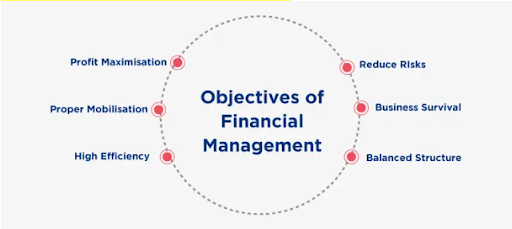Financial management objectives are one of the most important lessons for a business. Knowing the objectives of financial management is crucial to avoiding situations where your business might go bankrupt or face major losses. Our article is here to help you learn about objectives and set goals for financial management.
What is financial management?
Financial management is the discipline that deals with the planning, growth, and systematic usage of funds. The objectives of financial management include oversight over revenues and expenditures as well as managing risk and capital. Read our guide to fully understand what financial management is and the objectives of financial management.


POSTGRADUATE PROGRAM IN
Financial Analysis, Valuation, & Risk Management
Learn financial modeling, valuation techniques, and risk management to drive strategic business decisions.
15 Major Objectives of Financial Management
The goals and objectives of financial management are the efficient and effective management of financial resources. Some of the prime objectives of financial management are as follows:

1. Improves organizational effectiveness:
The objectives of financial management increase the efficiency of an organisation by providing it with the necessary information to make informed decisions. This helps make sure that the organisation uses its resources in the most efficient way possible.
2. Profit Maximization:
The objectives of financial management also help an organisation maximise profits by providing it with tools for analysing its costs and revenues, which allows it to determine whether its pricing is appropriate for the market or not. It can also help determine when it should increase or decrease production based on demand for its product or service.
3. Proper Mobilization
Proper mobilisation is one of the other objectives of financial management. This includes investing in research and development so that new products can be developed more quickly than before; investing in human capital development so that employees remain motivated and engaged over time; and investing in physical capital development so that there is adequate space within which employees can work efficiently to help the financial manager achieve its objectives.
4. High Efficiency
This objective of financial management tells a company that financial management should concentrate on the efficiency of its operations. Efficiency can be achieved by reducing costs, maintaining a high level of output, reducing time lags between inputs and outputs, and ensuring the financial manager’s objectives are met. The goals of financial management ensure you are in line with company strategies as well.
5. Maintenance of Liquidity
One of the important objectives of financial management is to aim at monitoring the liquidity within the company. Liquidity refers to the ability of a company to meet its short-term obligations without suffering any loss in value. The liquidity position should be monitored regularly, as it is an important factor in assessing the financial health of an organization.
6. Proper Estimation of Financial Requirements
Financial planning helps in determining the amount of funds that will be required over a period of time. This enables management to evaluate its financial position at periodic intervals, assisting them in taking corrective action when required.
Becoming a financial analyst and learning more about the objectives of financial managers is an exciting road ahead. Read our detailed guide on how to become a financial analyst and give a jumpstart to your career. The Hero Vired Financial Technologies programme is one of the most prestigious programmes for learning financial management.
7. Proper Utilization of Financial Resources
When you’re running a business, you need to be sure that you’re using your financial resources in the right way. To stay aligned with the objectives of financial management, here are three things to keep in mind:
8. Reduce Risks
When you are managing your company’s finances, it’s important to keep in mind that the financial management objectives for your business are not just to make money—they’re also to reduce risk. You want to be able to take on new projects, but you don’t want those projects to put your business at risk. If you have the goals of financial management set aside already, you’re more likely to keep an eye on risks.
9. Business Survival
You also need enough money in the bank so that if something goes wrong, you can pay your employees and keep the lights on long enough until you’re able to fix whatever went wrong. As per the objectives of financial management, this means planning ahead and making sure you have a contingency plan for any unexpected problems or expenses that could come up.
10. Balanced Structure
Finally, it’s important to have a balanced structure for your company’s finances to stay aligned with the Financial Management objectives—that is, one where all areas of your business have equal access to capital and resources so that none are more valuable than others or given priority over another area simply because they’re more profitable at this time. These financial management objectives can either make or break all your financial Management strategies.
11. Determination of Capital Structure
This is important if your financial management goals are aligned. Once you’ve assessed your capital needs, you can determine which financing options will best suit those needs, which will help you set up a successful capital structure for your company.
12. Optimizing Marketing Activities
If you do not have an effective marketing strategy in place, then you may find yourself struggling to increase your sales and profits. You also need to make sure that you are using the best possible marketing strategies for your particular business type and industry.
13. Assessing Capital Needs
Understanding your company’s needs and setting realistic goals are essential for building a strong foundation for your business.
14. Resource Optimization
Finally, once all of this has been done and we have our capital structure set up, we need to make sure that we’re using our resources as efficiently as possible—both internally and externally. Our detailed explanation will shine a light on all your questions and help you understand the role and responsibilities of the financial manager.
15. Measure Your Success
It’s important to measure your success regularly so that you know whether or not you’re meeting your goals and making progress towards them! Your financial management goals can act as a scale to measure where you stand.

Conclusion
The primary and most important objective of financial management is to maximise the return on investment (ROI) in a way that fulfils the objectives of any firm while keeping the risks under control. If you’re planning to carve out a career in financial management, Herovired offers excellent financial management courses & certifications.
What is the prime objective of financial management?
What are financial management skills?
What are the characteristics of financial management?
- Financial analysis
- Financial forecasting
- Capital Budgeting
What are the features of financial management?
- Planning
- Controlling/monitoring
- Decision-making/implementation
What is the financial management process?
Updated on October 16, 2024
